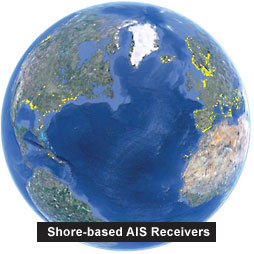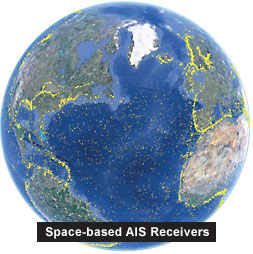|
|


|
Dear Colleague,
On behalf of the organizing committee of the CANEUS Shared Small Satellites for
Collective Security, Safety, and Prosperity (CSSP) International Workshop, we would
be honored if you could partner with this historical event, to be held on October
20-22, 2010, at Marina Di Carrara, Tuscany, Italy.
The CANEUS Shared SmallSat CSSP International Workshop is organized by representatives
from the Americas, Europe, Asia, and Africa. The core premise of this workshop is
that a multi-national, shared infrastructure will promote cooperation, trust and
interdependence, to the mutual benefit of all participants. Thus, this event represents
a unique and ambitious attempt to bring together the users of ship position and
other sensor data, small satellite system and space infrastructure developers, ground
support and services providers, funding communities and policy-makers with stake
in collective safety, security and prosperity, from across the world. For more details,
please see: http://caneus.org/sharedsmallsats/downloads/CANEUS_CSSP.pdf
As a partner, you will be afforded an opportunity to gain valuable exposure to a
broadly represented international audience, as well as, influence future international
collaborations aimed at the development of Shared Small Satellites for global safety,
security and prosperity. We feel strongly that your participation at this unique
international forum would yield much mutual benefit. We would be grateful if you
would accept our invitation to this historic undertaking.
Should you be interested in exploring the partnership opportunities, please phone
or e-mail me or my colleagues. We look forward to an early reply.
Best regards,
Milind Pimprikar
Chairman CANEUS International and
Co-Chair CANEUS Shared Small Satellite Planning Committee
|
|
CANEUS CSSP Workshop Co-Chairs
|
Technical Co-Chairs
|
CANEUS Small Satellites Consortium Director
|
|
Jay W. Middour
Naval Research Laboratory
|
Robert McCoy
ORS, U.S. DoD
|
John Mittleman
Naval Research Laboratory
|
James Tugman
Naval Research Laboratory
|
Andrew Quintero
The Aerospace Corporation
|
|
|
|
The CANEUS Shared Small Satellites CSSP (Collective Security, Safety, and Prosperity)
International Workshop is the forum dedicated to fostering Global collaboration
to create a concept for space-based communications infrastructure owned and operated
by a multi-national cooperative. The capability envisions data extraction from position
reporting systems and other distributed sensors to enhance partners’ safety and
security. The NATO Undersea Research Centre (NURC) will be hosting the event from
October 20-22, 2010 in Marina di Carrara, Tuscany, ITALY.
The concept involves a network of simple ground terminals and nano-satellites to
provide access to ”unwired” places: open oceans, polar regions, jungles, and deserts.
Access to the entire shared capacity is available to the partner nations that contribute
materially to the constellation thus providing a significant return on the individual
investment of any participating partner. The multi-national, shared infrastructure
promotes cooperation, trust and encourages sharing of data to the mutual benefit
of the partners.
|
To Create a low-cost, internationally shared space based data collection and distribution
backbone with exceptionally low barriers to entry for participating nations.
|
|
|
Fractional Ownership Model
In the collaboration model, multinational participants partner to deploy a constellation
of relatively inexpensive nano-satellites and a network of small, moveable ground
terminals that together create an efficient, persistent communications infrastructure.
Partnership status in the Consortium of Member Nations is provided in return for
investment in the system. Investment may be monetary or in-kind contributions such
as launch services or ground station operation.
Each Consortium Member would be entitled to a share of the available bandwidth from
the total constellation. The satellites would relay data from that nation’s sensors
to a ground terminal (which may be in another country), and from there to an enterprise
server (in yet another country, perhaps) for distribution to the country owning
the data. That country could then choose to share this information to enhance cooperation
with the other Consortium partners and/or its neighbors who may not be participating
Participating nations become part of a new global information network supporting
safety, security, environmental protection and economic growth.
|

|

|
|
To-date, it has not been technically possible to establish a sufficiently affordable
and transparent capability to allow all nations to participate in a cooperative
program to collect situational awareness data from every place on Earth.
By using a global constellation, participating nations can collect and share data
from the “unwired world” that then can be used to enhance the safety, security,
economic development and environmental protection of each sovereign state.
Existing and proposed commercial systems lack transparency for all international
partners, being driven by profit incentives or hampered by classification and sharing
issues inherent with intelligence collection. Instead of facilitating the ubiquitous
exchange of information at the lowest possible cost, situational awareness derived
from commercial or intelligence sources is enjoyed by the “haves” but unavailable
to the “have-nots.”
Nations without the ability or means to establish situational awareness in their
“unwired” territories, including most of each country’s Exclusive Economic Zone
(EEZ), have little or no information about the illegal activities occurring there.
There is no perceived need to address these unseen threats. Resource allocation
and force structure decisions that would improve governance are starving for data.
|
|
DATA EXTRACTION
The format for AIS transmissions is standardized in International Telecommunications
Union documents, and AIS frequencies are widely (though not universally) protected
from non-safety broadcasts. For data from other sensors, standardization of the
message format and protection of the carrier frequencies are both issues that are
being, or should be addressed in a collaborative international forum.
DATA INTEGRITY AND SECURITY
Some of the data will be considered proprietary by the sensor owners. Commercial
encryption either at the sensor or on-board the spacecraft, with “ownership” (in
the sense of having the ability to decrypt data) is ascribed to the sensor owner.
DATA DISSEMINATION
AIS data can be shared freely among CANEUS Shared Small Satellites participants,
following the successful model of the Maritime Safety and Security Information System
(MSSIS) that collects, combines, and distributes near-shore AIS data from over 50
countries around the world.
GOVERNANCE AND MISSION CONTROL
A consortium of participating nations involved in both decision-making and in the
technical operations necessary to maintain the constellation and to maintain the
flow of data. The general structure suggested would be an international governance
board, supported by a program manager and a technical manager, with roles and responsibilities
developed as participants join the consortium.
|
“Effective AIS payloads and satellites can be constructed and launched quickly and
affordably. AIS data collected from space complements shore-based receivers. As
demonstrated from years of actual data taken from space and in spite of the numerous
data collisions, it is possible to recover a significant number of AIS messages
in real-time from space.”
– Dino Lorenzini, SpaceQuest
|







|
 It is certainly recognized that a global space partnership would have much broader
capabilities than just the maritime domain, but many have recognized the critical
vulnerabilities of the world’s maritime assets and the potential huge economic impact
their loss or significant impairment could generate, and thus the pressing need
for much better awareness of the maritime domain.
It is certainly recognized that a global space partnership would have much broader
capabilities than just the maritime domain, but many have recognized the critical
vulnerabilities of the world’s maritime assets and the potential huge economic impact
their loss or significant impairment could generate, and thus the pressing need
for much better awareness of the maritime domain.
|
|
– Guy Thomas, Science and Technology Advisor, United States Coast Guard
|

|
Workshop participants will include military, maritime authorities and law enforcement
agencies, government-sponsored “watchdogs”, non-governmental, private voluntary,
and international organizations, and industry.
Ultimately, the workshop aims to identify issues for the potential Concept of Operation
and international cooperation framework. It will also explore the particulars of
international technology developments and applications that complement and are enabled
by such a capability, so that a comprehensive profile of international impact may
be quantified. The workshop deliverables will help formalize an implementation and
transition plan for the operational phase of this international, cooperative nano-satellite
project.
The ability to detect and monitor suspicious activity and to share that information
will enable collaboration and cooperation among international partners to enhance
their collective security, and more effectively direct limited assets.
|
We expect to receive 400 international experts and participants, representing stakeholders
from all segments of the international space and maritime community, including technology
providers, end-users, and policy-makers.
End-Users Interested in AIS and Data Extraction
- Nation State Safety and Security Agencies, Maritime
Authorities, Law Enforcement Agencies, Defense Agencies, Pollution / Environment
Monitoring agencies, Search & Rescue Agencies, Government-Sponsored “Watchdogs”,
of Countries from around the globe.
- Nations without the ability or means to establish space
programs but have a need for situational awareness over their Exclusive Economic
Zones.
- Commerce, Transportation and Insurance Companies Involved
with the Trade Routes of the World’s Oceans, Seas, and Waterways
|
Small Satellite Infrastructure and Support Vendors
- Satellite Manufacturers (including spacecraft, instrument
providers, and their vendors)
- Satellite Constellations to Host Communications Payloads
- Launch Services Ground Support Services/Facilities,
Sensor Suppliers/Services
- Data Center Hardware suppliers
- Data management, Data Aggregators /Distributors; Communications
and Data Fusion Software Providers
|
Policy Makers and Regulators
- Space Based International Cooperation Partnerships,
Policy Think Tanks, Space Based Situational Awareness Consortiums (i.e. UN, NATO,
IMO, ITU, IALA, ICAO, EC, APEC, Others)
- National Space Agencies (30 Countries)
- Legal Policies and Regulatory Bodies for Proposed Data
Formats, Assigned Frequencies and Bandwidth
- Financial Supporters (Private and Government), and
International Funding Sources
|
International Space Systems and Operators
- AIS and Data Extraction Related Program Authorities:
Commercial, NGO’s and Government Operated
- Data Centers: both Commercial and Government Managed
- Ground Support, Command and Control Centers
- Data and Data Fusion Services such as the Maritime
Safety and Security Information System (MSSIS)
|
|
|

